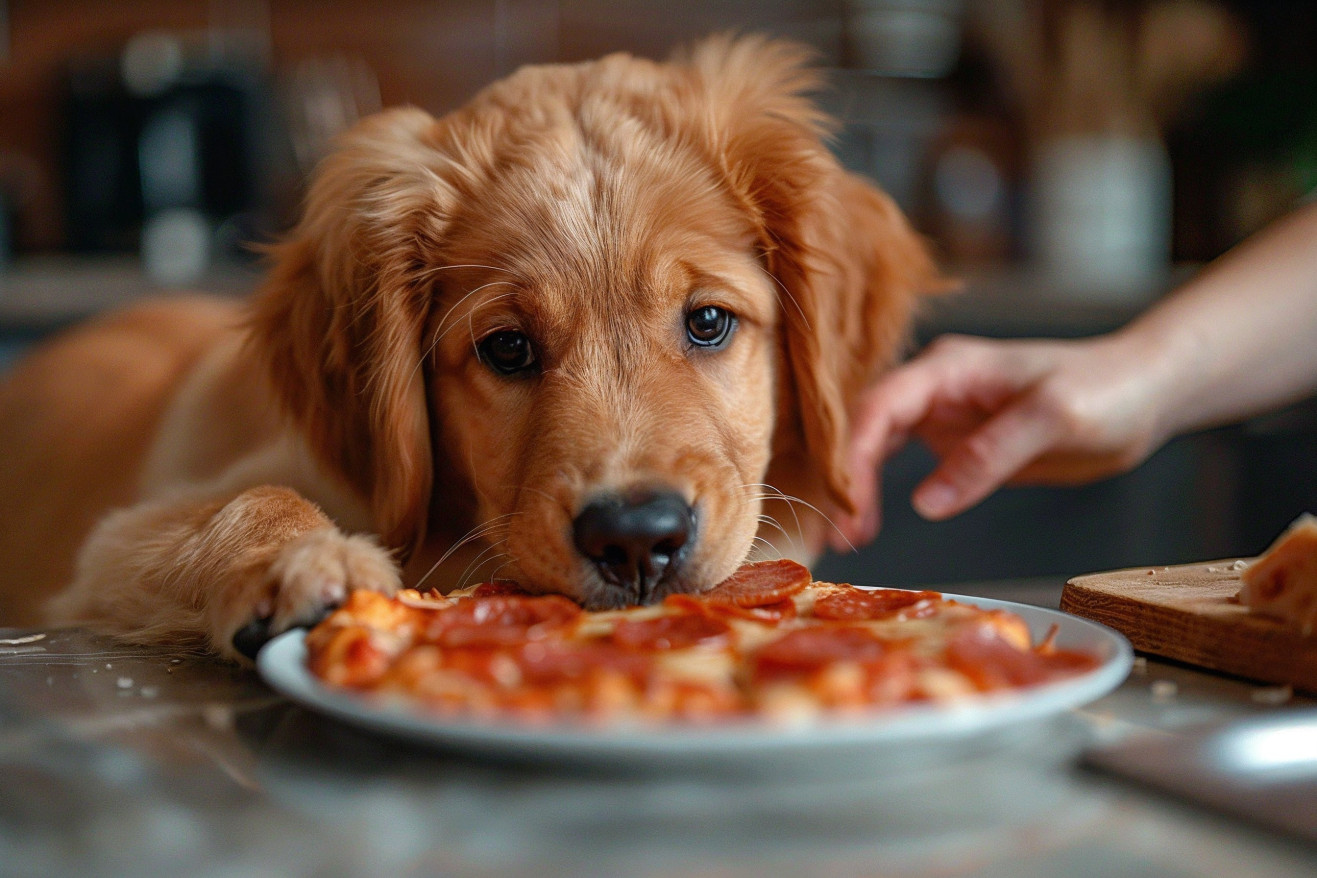Can Dogs Eat Pepperoni? A Look at the Dangers
22 April 2024 • Updated 21 April 2024

Many dog parents have been guilty of tossing their furry friend a slice of pepperoni, but it's important to know the dangers and limitations of feeding your dog this type of processed meat. Pepperoni's high fat and salt content can cause pancreatitis, obesity, and other health problems in dogs - however, small amounts are generally safe for most dogs.
By looking at information from vets and research on nutrition, we'll explain why pepperoni is bad for dogs in large quantities, why some dogs are more at risk than others, and how you can give your dog pepperoni in a way that's safe. Although the occasional piece of pepperoni is unlikely to hurt your dog, it's important to know the basics of feeding your dog human food so you can make sure they're as healthy and happy as possible.
Can dogs eat pepperoni?
The High Fat and Salt Content in Pepperoni is Dangerous for Dogs
Pepperoni is alarmingly high in fat, which can lead to the life-threatening condition of pancreatitis in dogs. As PetMD points out, the fat content is "especially dangerous for dogs" and "can cause stomach pain, vomiting, diarrhea, and decreased appetite" due to the inflammation of the pancreas. Meanwhile, the high salt content is just as worrisome, as excessive salt can lead to dehydration, excessive thirst, and even salt poisoning that requires immediate medical attention.
When dogs consume salt without water, the sodium draws water out of cells, which can lead to neurological symptoms like seizures as the cells in the brain become dehydrated. PetMD explains that the early signs of salt poisoning are vomiting, diarrhea, lethargy, lack of coordination, and excessive thirst, which can then progress to tremors, seizures, and coma if left untreated.
The smaller size of small breeds and puppies makes them more susceptible to these risks, as their bodies are less equipped to handle the high fat and salt content of pepperoni. However, these dangerous and potentially fatal outcomes can be avoided by simply not giving your dog this fatty, salty meat.
Spices, Preservatives, and Additives in Pepperoni
Many of the spices used in pepperoni, including garlic and onion, are toxic to dogs and can lead to anemia and other health issues. The American Kennel Club notes that these spices "can cause gastrointestinal irritation and even damage red blood cells."
Preservatives, such as sodium nitrite, are used to help pepperoni maintain its red color, and while they can be toxic to dogs in large quantities, they can also be harmful in smaller quantities. Volhard Dog Nutrition notes that excessive nitrate and nitrite consumption has been associated with heart disease and cancer in some dogs.
In addition, some of the other additives and flavorings in pepperoni, including paprika and fennel, can lead to allergic reactions and gastrointestinal issues in some dogs. Spot® explains that "the spices contributing to pepperoni's trademark taste...will only irritate the GI tract, leading to digestive issues."
Even if your dog doesn't have a pre-existing condition or sensitivity, these ingredients can still cause problems in large quantities. Always be sure to introduce new human foods to your dog with caution.
Healthier Alternatives to Pepperoni for Dogs
If you want to give your dog a treat, but you know that pepperoni is off-limits, there are healthier alternatives that you can use to reward your dog. WebMD suggests that lean, unprocessed meats like cooked chicken, turkey, or lean beef are better options, as they are lower in fat, sodium, and additives.
You can also opt for high-quality dog treats and chews that are approved by veterinarians, as these are made specifically for dogs. MasterClass says that these are better than processed human foods like pepperoni, salami, and sausage, which can be harmful to dogs.
For dogs with special dietary restrictions or health concerns, Origin Labs recommends working with a veterinarian or certified pet nutritionist to get personalized advice. They also note that their Puppy, Adult, and Senior Dog Ultimate Health Chews can help dogs get the support they need at different stages of life.
How to Tell If Your Dog Has Eaten Pepperoni
If your dog has eaten pepperoni, it's important to look out for signs of gastrointestinal upset, including vomiting, diarrhea, or stomach pain. PetMD notes that other symptoms to be aware of include increased thirst, tiredness, and neurological symptoms like seizures or confusion.
If you notice any of these symptoms, Under the Weather advises that you take your dog to the vet immediately, as early intervention can help prevent more serious issues. In certain situations, the vet may suggest vomiting or supportive treatments like IV fluids or medications, according to Vetster.
Conclusion: Make Sure You're Prioritizing Your Dog's Health and Safety
While a small amount of pepperoni isn't likely to be acutely poisonous to most dogs, it's still best to avoid giving this processed meat to your pets. The high fat, salt, and preservative content in pepperoni can cause a range of health problems, from pancreatitis and salt poisoning to general stomach upset.
The American Kennel Club says that pepperoni is "too spicy and too fatty" and can cause digestive upset and even pancreatitis in dogs. The PetMD article also notes that many of the ingredients in pepperoni, including garlic and onion, are toxic to dogs.
By sticking to healthier, vet-approved treats and snacks, dog owners can make sure that their pets are getting the best, most balanced diet possible. Volhard Dog Nutrition goes so far as to say that you should avoid pepperoni and pepperoni-based products altogether because the high levels of salt, fat, and spices can be so harmful to dogs.
It's always a good idea to talk to a vet or a pet nutritionist, especially if your dog has special dietary restrictions or health concerns. They can help you figure out the best, most personalized options for your dog that will keep them healthy and happy without putting them in harm's way.


